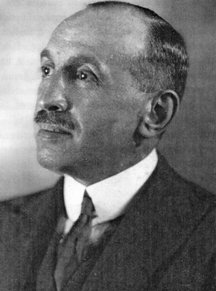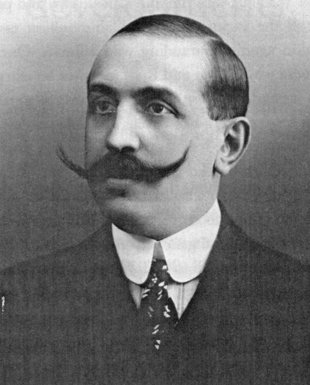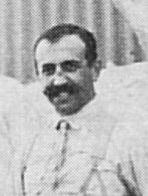View entry
Name: LOY, Rudl 'Rudolf'




Nee: born Rudl Lowy
Birth Date: 23 June 1880 Vildstejn, Pod Hradem, Bohemia
Death Date: 23 June 1939 Johannesburg, South Africa
Nationality: Austro-Hungarian
First Date: 1900
Last Date: 1939
Profession: Established EA Trading Company with O. Markus. After WW1 became the Old EA Trading Co.
Area: Mombasa, Zanzibar
Married: In Prague 1922 Hedwig Lauer b. 16 June 1892, d. 1963 Holborn
Children: Marie (21 Jan 1924 Prague-12 Apr 1935)
Book Reference: Gillett, EAWL, North, Playne, Macmillan, Glimpses, Red Book 1912, Drumkey, EAHB 1906, EAHB 1907
School: Export Akademie - Vienna
General Information:
Otto Markus was born on August 5th 1878 in Moravia, then a part of Austria, but after 1918 Czechoslovakia. He came from a comfortably off Jewish family who owned and farmed land and also owned a distillery. He was admitted to the newly formed Vienna Export Akadamie a Business School whose graduates were to help Austrian industry in its export drive. There he met Rudolf Loy who eventually became his business partner and also his brother-in-law.
On graduating from the Export Akadamie, Markus and Loy decided to go to BEA and begin trading there. However, before doing so they went to London so that they could acquire the necessary practical knowledge (and fluency in English of course) and also form the needed essential contacts with shippers, insurance houses, merchant banks and agents. Markus in fact had to undertake military service before joining Loy in London. Unusually for a Jew in the Austrian Army, at that time he joined a cavalry regiment. At the end of his military service he went to Paris where he worked for a short time before going to London.
In 1903 Loy and Markus decided to take the plunge and start their trading enterprise in Kenya. They raised money privately from their families; from banks; and they also had a subsidy from the Austrian Government. Moreover, Markus was appointed Austro-Hungarian Consul - shortly after their arrival in Kenya.
After landing in Mombasa they quickly surveyed the situation and travelled by train to Nairobi, taking 48 hours to do so. While there they were present at the first land sale in Nairobi, but believing the site to be wrong, they journeyed on to railway's end - Kisumu. They had walked in Kikuyuland and now they explored Kavirondo. They then travelled on to Uganda - on foot, with about 60 or 80 porters. During one of these safaris, Markus discovered wild cotton growing there. In 1904 on Markus' return to England, for business reasons, he took the cotton to the British Cotton Growing Association in Liverpool. As a result, experts were sent to Uganda and eventually the Uganda cotton industry was born.
Having assessed the situation, Markus and Loy then set up their EA HQ in Mombasa and founded their trading enterprise. Markus had also discovered the wild rubber tree growing in the Budongo forest, which they developed. Meanwhile Loy walked on through the Congo to the West Coast and then back again. The journey took 23 months and was remarkable not only in that it was probably the first, or at any rate one of the first of such journeys, but also because Loy lost not one single porter. The hazards were fierce. The end result was the ivory trading concession from the Congo which O. Markus secured after an audience with H.M. King of the Belgians. However, the most important export organised by the partners was hides and skins in which they became the leading company.
For very many years hides and skins were one of the major sources of foreign exchange for Kenya and indeed all of EA. Later on they developed and became leading coffee traders with world links, and established a coffee curing works in Kilindini, where, incidentally, they were the first industrial employers of African women. Naturally imports were also of vital importance, and they were agents for the Ford Motor Company. By 1913, apart from Smith McKenzie & Co., their company, the East African Trading Company, was the largest such concern in EA. The war of 1914-18 ended this, since Markus and Loy were Austrian. As Consul, Markus was shipped back to Vienna, while Loy was interned and sent to India where, through lack of transport after the end of the war, he was forced to remain until 1921.
In 1923 the 2 partners returned to Kenya to start again, from scratch, and in competition with their own creation. Their original company had been taken over and was renamed The African Mercantile Company. Markus and Loy called their new company The Old East African Company - to differentiate it from the original. In 1949 this company was sold to the East Asiatic Company of Copenhagen. Loy died on 3rd March 1939 and Markus on 3rd March 1955. ......…
My grandfather and his partner, Rudolf Loy (anglicised from Lowy) came to BEA in 1903. They had met in Vienna at the Export Akademie - one of Europe's first business schools. The Austro-Hungarian Empire (Europe's largest Empire) unlike other European 'Empires' had no overseas 'Empire' (cf. Holland, Spain, Portugal, France, Gt. Britain). At the end of the nineteenth century the recently united Germany also began to think about overseas connections. For ALL these countries TRADE was paramount and therefore the Austro-Hungarian Empire decided to train young men to carry the flag and trade abroad (as Britain had been doing for the last 300+ years). So far as EA is concerned their efforts in exporting products produced there was immeasureable - and also, it must be said, their imports too were vital to the growth (economically, socially, domestically) of the territories. They lost their company during WW1 - and after a Court Case at the new League of Nations in Geneva which they won (1922), they lost finally by a decision in the House of Lords - so the African Mercantile Company which had taken over their original business was allowed to continue. They consequently had to start from scratch again and this time with NO subsidies! They worked all the hours there were ..Source: Mrs E. Pollecoff, Glimpses - Rudl Lowy (soon anglicized to Rudolph Loy)
Red Book 1912 - R. Loy - Mombasa
Block Notes - Mombasa 1903 - "My first task was to try and find any co-religionists already settled in Mombasa and to my surprise there were 2 Austrian Jews, a man by the name of Marcus [sic](still living at the coast) and a Mr Lowe. They were partners in a trading concern and Mr Marcus was acting Consul for the Austrian Government, also agent for the shipping lines.
EAHB 1907 - Mombasa (E.A.T. Co.)
Also used the name Rudolf Lowry (he appears thus in Ancestry)
